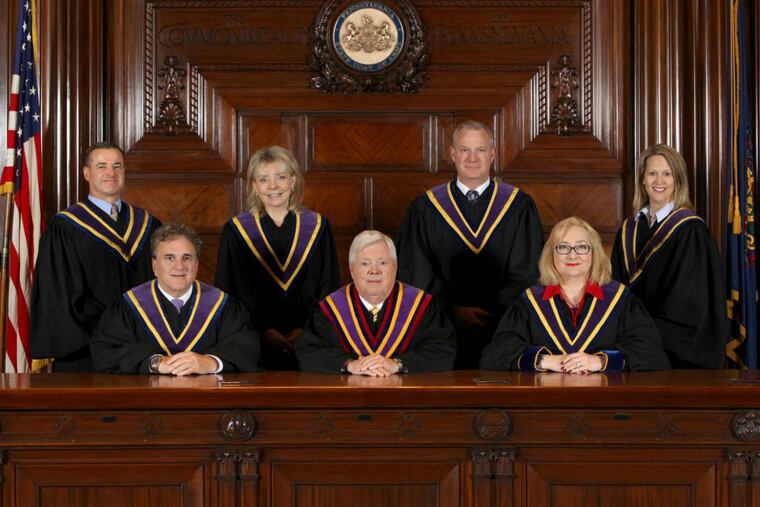After barely surviving 2020, Pa.’s democracy might not survive the Republican effort to gerrymander the court | Editorial
The constitutional amendment that would gerrymander Pennsylvania's high courts is a power grab.

The effort of Republicans to usurp the will of the people in the presidential election by any means possible failed in large part because the judicial branch wouldn’t entertain nonsensical claims of fraud.
» READ MORE: Angered by Pa. Supreme Court rulings, GOP moves to exert more control over judiciary branch
For years, the state’s appeals courts have been a thorn in the side of Republicans. In 2014 a Commonwealth Court judge struck down a Republican voter ID law. Four years later, the state Supreme Court struck down the legislature-drawn congressional district map and redrew it to be more fair. Then in the months before the 2020 election, and after, the state Supreme Court joined federal courts to reject baseless allegations of fraud. Republicans called for the impeachment of Democratic justices both in 2018 after the redistricting case and in 2020 after cases related to the election and the constitutionality of stay-at-home orders.
Apparently, if you can’t beat them, or impeach them, gerrymander them.
Pennsylvania Republicans in the General Assembly are fast-tracking a constitutional amendment that will fundamentally change the state’s three courts of appeals — Commonwealth, Superior, and Supreme Courts — by electing judges based on newly created districts instead of statewide elections.
If both chambers pass the measure before Feb. 18, it will be on the ballot in the May primary.
Proponents of the measure point out that a majority of judges in the statewide courts are from either Philadelphia or Allegheny County — including four of seven Supreme Court justices. State Rep. Russ Diamond (R., Lebanon), who introduced the amendment, argues that geography is part of what shapes judicial ideology, and the high courts should reflect geographic diversity.
» READ MORE: Pa. could become a national outlier in how it elects appellate judges. Here’s why experts are worried.
The constitutional amendment is not an effort to increase representation on the bench. It is a power grab by the legislative branch. Gerrymandering, the exercise of drawing district maps to ensure politically homogenous districts, has become a science. By drawing and controlling the map of judicial districts, the legislature would control the branch that is supposed to act as its check.
The process of drawing the map will be another partisan fight — just as drawing legislative districts maps is now. How will disputes over the fairness of the map, as the one the court settled for congressional districts in 2018, be addressed when the court itself is at issue?
Judicial districts don’t only give more power to the legislature, they also give donors and interest groups more power to influence judges.
Narrowing the constituency of judges would make them more partisan and susceptible to pressure from their district — instead of ruling impartially in cases that impact the entire commonwealth.
The amendment has drawn wide criticism from experts and even from former Republican Chief Justice of the Pennsylvania Supreme Court Ronald Castille.
» READ MORE: Former Pa. Supreme Court chief justice: It’s time to change how judges get their jobs | Opinion
If Republicans want more seats on the bench, they should do the hard work of winning statewide elections. Ironically, the recent election that Republicans called fraudulent was proof that they can win statewide offices in Pennsylvania.
Voting is only one issue that comes in front of the Supreme Court. The judiciary is a critical, yet often opaque, check on the other branches of government. Those interested in justice should make their objections to this shameless proposal heard.